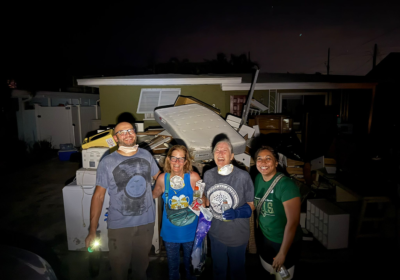Survey gives glimpse of election issues

The economy is the most important issue to Florida voters and partisanship is the biggest obstacle in solving it, according to the 2014 Sunshine State Survey.
The annual survey, conducted over summer by the USF College of Arts and Sciences in partnership with Nielsen Holdings, aims to provide insight to public officials and business leaders on a range of economic, social and political issues critical to a diverse Floridian population.
The first results of the survey, released Thursday, focused on public perception of Florida leadership and issues politicians may face in the November elections.
On the major issues facing Florida today, 30 percent surveyed said economy and jobs were the most important issues, down from 44 percent in 2012.
Susan MacManus, survey developer and USF political science professor, said the 14 percent decline reflected slowly growing confidence in the economy.
Rising in importance was public school education, which ranked second at 12 percent.
To solve these problems, the survey also asked what leadership quality was most desirable. More than 60 percent cited integrity or honesty, while 10 percent said consensus-building skills.
MacManus said the importance of honesty underscored the public’s distrust in leaders.
“It is critical, in a time that Florida faces so many challenges, to look at which leaders people have the most trust in,” she said. “Most say that business and government leaders can only be trusted some of the time. This is, I think, a red flag.”
The highest amount of trust is found in social service and non-profit business leaders, while the lowest amount of trust was in federal officials. Only 2 percent of those surveyed said they almost always trusted the federal government, compared to 36 percent who said they trusted their local government.
MacManus said local government, which is more active in the community, is perceived as more in touch. Furthermore, scandals in federal and state government are also more highly publicized.
“There’s a broad brush that everyone paints with when they see the imagery of news reports day in and day out,” she said.
In the public’s opinion about what hindered solutions, 28 percent of Floridians said political differences divided Floridians more than race, religion, gender, age or sexual preference, whereas 17 percent said the gap between the goals of elected officials and the needs of average citizen was the dividing line.
MacManus said both opinions represented an “us versus them” mentality.
The poll also broke down the diverse social views among different Floridian demographics.
African-Americans and younger citizens, for example, were twice as likely to state income inequality as a more decisive divide than racial, gender or partisanship differences.
Senior citizens tended to be most concerned about honesty and parents concerned about integrity in public leaders, while the well educated were most likely to stress consensus building.
Though the survey was conducted as more than just a tool for politicians, MacManus said the results could help public officials shape their platforms in the upcoming elections.
“One of the things that’s helpful to public policy makers when seeing this is that you see certain dimensions of leadership is more desired by different parts of our state’s population,” she said. “When people have time to drill down into this survey, and a public official sees there’s a concern about compassion, you can actually be more directive in your programs to better target the needs and concerns of Florida’s residents.”
In the next five weeks, USF will continue to release survey results weekly. Each release will focus on various subjects in depth, such as education and transportation. A full release of the 2014 results can be found at sunshinestatesurvey.org/results.






